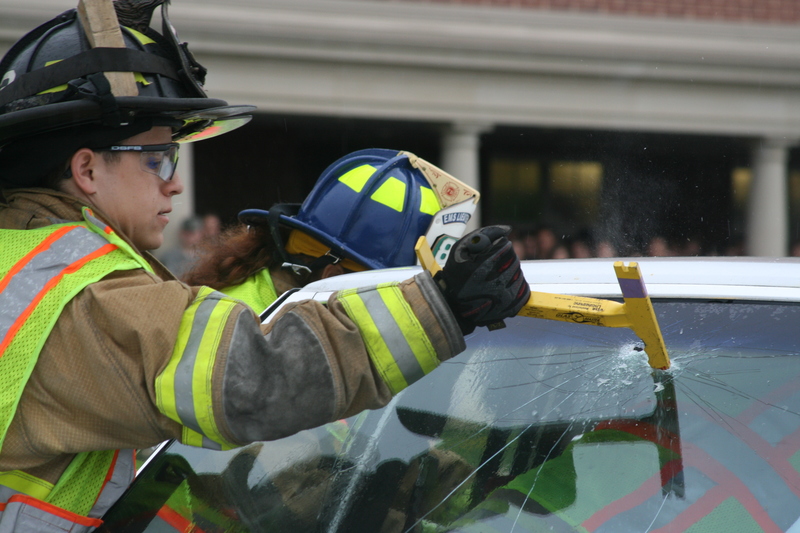Mock accident warns against driving drunk
Firefighters methodically dismantle the car, cutting out its windshield and removing its top. Paramedics assess the victims inside, as police order the driver to walk a straight line in a sobriety test.
It's a mock drunk-driving accident, staged May 4 at Cape Henlopen High School. But, the two injured and one killed appeared all too real to some of the hundreds of students who looked on through the rain.
While emergency workers extricated victims from the car, others put the body of the girl playing the crash victim into a body bag and then into a hearse from Parsell Funeral Homes.
With Cape's prom Saturday, May 7, school officials and student actors teamed up with Beebe Medical Center, Delaware State Police, Lewes Police and Fire Departments and Sussex County Emergency Management Services for a morning-long drunk-driving awareness program that included guest speakers Andrew Parsell of Parsell Funeral Homes and Bradley Owens, whose sister, 2008 Cape grad Jordyn Owens, died in a drunk-driving accident two years ago.
Close to home
Bradley Owens told students the story of his sister's death. He said underage drinking is never worth the risk.
"I don't condone underaged drinking. I've been there and done that, and I can't remember one time when it was worth it," Owens said.
"Before you drink, or if you do, think in the most negative way. You are going to kill yourself or someone else if you drive," he said.
A 2006 Cape grad, Owens told students he'd come home from college and he and his friends were having a typical basement party. Near midnight, it was time to go home, and his sister and three of her friends were ready to leave, he said, facing a short two-mile trip home.
He asked how she was getting home. "She just twirled her keys around her finger. I didn't say anything. I just shook my head, and she walked away," he said.
He called her cell phone many times before her friend finally answered. "She was screaming bloody murder, telling me my sister had flipped the car, and I should come immediately," he said.
He and the police reached the accident scene at the same time. "I don’t know if you can imagine calling your parents at 1 a.m. telling them what's going on," he said.
The family met at Beebe Medical Center, said Owens, where staff "were trying to tell us it would be alright when it's obviously not."
When the family reached Christiana Hospital, where Jordyn was sent, the chaplain was waiting for them. "At that moment, I knew my sister was dead. It was absolutely traumatizing," he said.
Jordyn was studying at Delaware Technical and Community College to be a teacher, Owens said. Had she lived and been charged with a DUI, her future as a teacher would have been in jeopardy, he said.
"When you see the depression of your family – that stuff is real. It's all very real," he said.
He told students to think of their futures, their friends and families before they drink. He told them to stay where they are, or call for a ride.
"Call your mother. You might be in trouble, but she'd rather pick you up and ground you than see your body in the hospital," said Owens.
He said he still feels bad for not telling Jordyn not to drive home. "I made a mistake. She made a mistake. I want to make amends for that, and I want to share her story. I hope you can relate," he said.
Planning funerals
Jordyn's funeral service was held at Cape on Andrew Parsell's 21st birthday.
"My first job as a funeral director was to plan my close friend's funeral," he said.
Parsell told students drunken driving removes their power. "When you come and see me, you're powerless. Your friends and family are powerless. It's just me and your body," he said.
He told students how difficult it is for families to plan funerals for young people.
"In a crash without a seatbelt or at high speed, your body is destroyed. You lose limbs, your face is destroyed. Then, I have to start putting your body back together," Parsell said.
He ran through a list of statistics showing how families of teens killed in drunk driving accidents suffer:
-80 percent suffer clinical depression
-50 percent of parents will quit their jobs and distance themselves socially
-Siblings are less likely to succeed
-25 percent of parents become addicted to drugs and alcohol
-28 percent of parents divorce
-Parents are more likely to engage in deficit spending, and family members are more likely to attempt or succeed at suicide
Each year, Parsell said, his business handles funerals for 10 or more families who lose loved ones to drunk driving.
In the emergency room
Cheryl Littlefield, an emergency-room nurse at Beebe and mother of two Cape students, walked students through the injuries sustained by a 17-year-old in a hypothetical crash.
Littlefield showed students power-point images as she quickly walked them through the medical response to a crash.
From the first report from paramedics through the patient's arrival at Beebe, the trauma teams plans tests and procedures needed to diagnose the patient's injuries from intubation through X-rays, scans and bloodwork.
The patient in Littlefield's scenario had a spinal-cord injury and had to be sent to another hospital. X-rays and brain scans showed broken ribs and a brain hemorrhage.
After a long stint in rehab, the patient returned home paralyzed.
Littlefield told students car accidents can leave a lifetime of trauma and difficulty, sometimes death from complications.
"If they don't have insurance, it's very hard on mom and dad to take care of the bills. We'll take care of you no matter what. If you're 18, it could be you who has to handle the bill," she said. The family could lose its home, she said, and a patient with a traumatic brain injury might not be the same person the family knew before the accident.
"Your friends aren't around much. Your friend's family you were close to before now doesn't want to see you. You have to deal with the fact you were driving the vehicle that resulted in your best friend's death," Littlefield said.
"It's very important we get the word out, so we don't see you in our ER," she said.
Law-enforcement investigation
Delaware State Police Cpl. Jay Burns works with the accident-reconstruction team.
"We handle only fatal accidents in Sussex County. It is a full-time job," Burns said. Using photographs and documenting evidence at the scene of the accident, then comparing it to witness statements, team members try to reconstruct what happened, Burns said.
Intoxicated driving and aggressive driving are fatal, said Burns.
"I would love to do these things and talk myself out of a job," Burns said. He said people are stubborn, think they know it all and think they are invincible. But, he cautioned students, saying they don't have the driving experience necessary to keep them safe, regardless of how quick their reflexes are.
"Part of my job is to knock on the door and tell mom and dad their son or daughter isn't coming home. It is not a fun job," said a somber Burns.
One accident involved an 18-year-old whose blood-alcohol level was nearly three times the legal limit. He showed a photograph of her upside-down car, which was nearly flattened by its roll.
Not wearing a seatbelt, she was ejected from the car. "You're going to hit something, and it's not going to be soft," Burns said.
"You are thrown in the direction the vehicle is traveling. You go farther, but it has more momentum. It will roll on top of you. You are not thrown free and clear of the car's path," said Burns.
Burns also showed images from the May 2009 crash that killed Jordyn Owens.
"This crash happened where we never would have expected a crash to happen," Burns said. Owens' Jeep flipped in Rehoboth Beach Yacht and Country Club.
There was little visible damage to the Jeep. "Does it look like anybody should have died? There's no damage to the passenger compartment," said Burns. "Had she been wearing a seatbelt, she would be with us today."
Burns said state police will step up patrols during prom weekend and told students to make good decisions.
"It's illegal, it's wrong, and I know it's going to happen," he said, of underage drinking. "Please make good decisions. Please find someone to drive you, stay where you are or get a ride because the alternative is us coming out and notifying your family you're not coming home at all," Burns said.


















































